.
Based on Merriam-Webster's
Collegiate® Dictionary
Use the BACK button
on your browser to return
kilter.noun
proper or usual state or condition
knell,
knelled,
knelling,
knells.verbs
intransitive
verb use.to ring slowly and solemnly,
especially for a funeral; toll;
to give forth a mournful or ominous
sound
transitive
verb use.to signal, summon, or proclaim
by tolling
knell.noun
the sound of a bell knelling; a toll; a signal
of disaster or destruction
kudo.noun
compliment, praise
kaon.noun
an unstable meson
produced either in an electrically charged form with a mass
966 times that of an electron or in a neutral form with a mass 974 times
that of an electron as a result of a high energy particle collision
keratin.noun
an albuminous (a complex protein as found in eggs,
muscle, blood, tissues, etc.) substance forming the principal matter of
hair, nails, horn, etc.
Kirlian photography.noun
the process of photographing an object by exposing
film in a dark room to ultraviolet light that results from electronic and
ionic interactions caused by an electric field (pictures of leafs 1,
2;.check
also YouTube videos of fingers, etc.); photograph thus taken shows a light,
glowing band surrounding the outline of the object. Book – The Kirlian
Aura
kin.noun
one's relatives; family; kinfolk; kinsman or kinswoman
kin.adjective
related; akin
kinship.noun
connection by blood, marriage, or adoption; family
relationship; relationship by nature or character;
affinity
kindred.noun
a group of related persons, as a clan
or tribe; a person's relatives; kinfolk
kindred.adjective
of the same ancestry
or family (kindred clans); having a similar or related origin, nature,
or character (kindred emotions, kindred spirits or attitues)
kindredness.noun
kinetic.adjective
of or relating to the motion of material bodies
and the forces and energy associated therewith; active, lively; dynamic,
energizing
kinetically.adverb
kinetic energy.noun
energy associated with motion
kinetic theory.noun
also called kinetic theory of gases; either of
two theories
in physics based
on the fact that the minute-particles
of a substance are in vigorous
motion; a theory that the particles of a gas move in straight lines with
high average
velocity,
continually encountering one another, thus
altering their individual velocities and directions, and causing pressure
by their impact against the walls of a container; a theory that the temperature
of a substance increases with an increase in either the average kinetic
energy of the particles or the average potential energy of separation (as
in fusion) of
the particles or in both when heat is added – called also kinetic theory
of heat
kinematics.noun
the branch of mechanics that studies the motion
of a body or a system of bodies without consideration given to its mass
or the forces acting on it
kinematic or kinematical.adjective
kinematically.adverb
knead,
kneaded,
kneading,
kneads.transitive
verbs
to mix and work into a uniform mass, as by folding,
pressing, and stretching with the hands: kneading dough; to make or shape
by or as if by folding, pressing, and stretching with the hands; to squeeze,
press, or roll with the hands, as in massaging
kneader.noun
kelp.noun
any of various brownish, nutritious seaweeds that
grow along colder coastlines. Seaweeds (sea vegetables) are high in necessary
vitamins and minerals
keen,
keener,
keenest.adjectives
having a fine, sharp cutting edge or point; having
or marked by intellectual quickness and acuity;
sharp; acutely sensitive (a keen
ear); vivid; intense; piercing (a keen wind); pungent;
acrid
(a keen smell of skunk was left behind); ardent;
enthusiastic
(a keen chess player); eagerly desirous (keen on going to Europe in the
spring); eager
slang.great;
splendid; fine (what a keen day!)
keener, keenness.nouns
keenly.adverb
keepsake.noun
something given or kept; a memento
kindling.noun
easily ignited
material, such as dry sticks of wood, used to start a fire
kindle, kindled,
kindling,
kindles.verbs
transitive verb use.to
build or fuel (a fire); to set fire to; ignite;
light up (the sunset kindled the skies); to arouse an emotion (the music
kindled fond memories of my home town)
intransitive verb use.to
catch fire; burst into flame; to be stirred up
kindler.noun
kindle
a brood or litter, especially of kittens; flock
kindle, kindled,
kindling,
kindles.intransitive
verbs
to give birth
kleptocracy.noun,
plural.kleptocracies
a government characterized
by rampant greed and corruption
kleptocratic.adjective
King Henry VIII (1491-1547)
king of England (1509-1547)
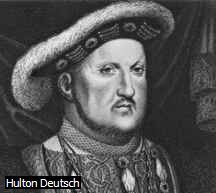 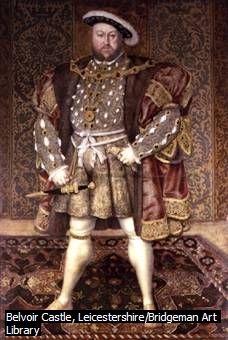 Henry
VIII had six wives, fought numerous wars in Europe and even aspired to
become Holy Roman Emperor in order to extend his control to Europe. He
rejected the authority of the pope and the Roman Catholic Church, confiscated
church lands and promoted religious reformers to power. His greatest achievement
was to initiate the Protestant
Reformation in England. He ruthlessly increased the power of royal
government, using Parliament to sanction his actions. Henry ruled through
powerful ministers who, like his six wives were never safe in their positions.
He is most famous for founding the Church of England and for having six
wives, two of whom he had beheaded. Henry
VIII had six wives, fought numerous wars in Europe and even aspired to
become Holy Roman Emperor in order to extend his control to Europe. He
rejected the authority of the pope and the Roman Catholic Church, confiscated
church lands and promoted religious reformers to power. His greatest achievement
was to initiate the Protestant
Reformation in England. He ruthlessly increased the power of royal
government, using Parliament to sanction his actions. Henry ruled through
powerful ministers who, like his six wives were never safe in their positions.
He is most famous for founding the Church of England and for having six
wives, two of whom he had beheaded.
Henry's
wives were:
Catherine of Aragón-was
married to Henry at twelve years old. The pope refused to make a decision
on Henry's proposed annulment and in 1533 Henry was married to Anne
Boleyn by the archbishop of Canterbury. In 1534 the pope finally declared
that the first marriage was valid, thus bringing about the alienation of
Henry VIII from the Roman Catholic church. Catherine did not quit the kingdom,
but was thereafter closely guarded. During this time she displayed heroic
courage and steadfastly refused to sign away her rights and those of Mary
her daughter.
Anne Boleyn-lasted
less than a month, Henry having tired of her quickly. On May 2, 1536 Anne
was imprisoned in the Tower of London on apparent
charges of adultery with her brother, three gentlemen of the privy chamber
and a musician of the court and of conspiring with these men against the
king's life. She was executed and replaced by Jane Seymour.
Jane Seymour-served
as a lady in waiting to Catherine of Aragón and later to Anne Boleyn.
Less than two weeks after the execution of Anne Boleyn, Jane privately
married the king. She died on October 24, 1537, 12 days after the birth
of her son, Edward, Henry's only male heir, later King Edward VI of England.
Her portrait was destroyed by fire in 1698.
Anne of Cleves was
divorced by Henry six months into the marriage on July 9, 1540.
Catherine Howard-was
accused of immoral conduct both before and during her marriage. She admitted
to premarital relations and her accusers produced witnesses to testify
to her adultery. Two of her accused lovers were beheaded in December and
on February 13, 1542, she, too, was beheaded in the Tower of London.-
Catherine Parr-was
sixth and last queen of Henry. After Henry's death and the accession of
Edward VI, she married the new king's uncle, Thomas Seymour, Baron Seymour
of Sudeley.
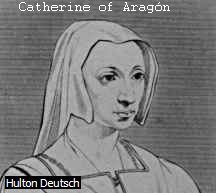 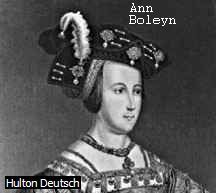
comprised
from Microsoft® Encarta® Encyclopedia 99. © 1993-1998 Microsoft
Corporation. All rights reserved
kingpin.noun
the most important person or element in an enterprise
or a system; the foremost or central pin in an arrangement of bowling pins,
also called head pin
Martin Luther King Jr.,
1929-1968 (assassinated), American clergyman and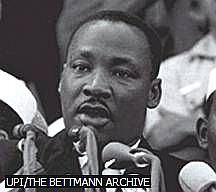 Nobel Prize winner, one of the principal leaders of the American civil
rights movement and a prominent advocate of nonviolent protest.
Nobel Prize winner, one of the principal leaders of the American civil
rights movement and a prominent advocate of nonviolent protest.
Martin Luther King, Jr., was born in Atlanta, Georgia,
the eldest son of Martin Luther King, Sr., a Baptist minister, and Alberta
Williams King. His father served as pastor of a large Atlanta church, Ebenezer
Baptist, which had been founded by Martin Luther King, Jr.'s maternal grandfather.
King, Jr. was ordained as a Baptist minister at age 18. Throughout his
education, King was exposed to influences that related Christian theology
to the struggles of oppressed peoples. At Morehouse, Crozer, and Boston
University, he studied the teachings on nonviolent protest of Indian leader
Mohandas Gandhi. King also read and heard the sermons of white Protestant
ministers who preached against American racism. Benjamin E. Mays, president
of Morehouse and a leader in the national community of racially liberal
clergymen, was especially important in shaping King's theological development.Microsoft®
Encarta® Encyclopedia 99. © 1993-1998 Microsoft Corporation.
All rights reserved.
Ask
Suby
.
Terms
of Use Privacy
Policy
.
|